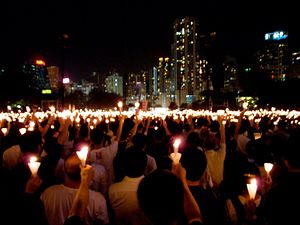For decades, every night on June 4, Hong Kong’s Victoria Park would transform into a sea of flickering lights, as tens of thousands hold candles in a vigil commemorating victims of China’s Tiananmen Square Massacre – a tradition banned for the first-time last year by authorities citing COVID-19 concerns.
This year, the vigil will not take place yet again. Despite celebrating a streak without a single traceable local COVID-19 case in recent weeks, police banned the vigil again for the second year in a row, again citing pandemic-related risks. Activists were also denied permission for a small Tiananmen-themed march on May 30.
Last week, Hong Kong’s Security Bureau warned that those taking part in the vigil – officially an unauthorized assembly – or promoting it could face up to five years in jail. The bureau added that whether the event involved violence or not was irrelevant.
Such moves have exacerbated fears over the vigil’s future, with many wondering whether they will be able to freely commemorate June 4 ever again.
Since Beijing imposed a sweeping national security law last summer criminalizing various forms of dissent, activists have fought to protect the city’s pro-democracy legacy. The memory of June 4, preserved every year by the vigil – the only mass remembrance on Chinese soil of Beijing’s crackdown on students calling for democracy on June 4, 1989 – is a core part of this struggle. Following the crackdown, Hong Kongers helped hundreds of dissidents flee the mainland in a rescue mission codenamed “Operation Yellow Bird.”
The vigil is not only a reminder of the massacre itself, but also a marker of the freedoms enjoyed in Hong Kong in contrast to mainland China, where the massacre has been erased from history and remains heavily censored. Yet activists say the memory of June 4 is already under threat in the city.
On Wednesday, Hong Kong’s June 4 Museum temporarily shut down due to a licensing probe by the Food and Environmental Hygiene Department. Earlier this week, street booths calling on Hong Kongers to remember victims of the massacre were approached by police and harassed by passers-by, according to Hong Kong Free Press.
Police also arrested “Grandma Wong” a 65-year-old democracy activist, for participating in a solo Tiananmen protest on Sunday, and teachers are refraining from teaching students about the massacre for fear of crossing “red lines” under the security law, the South China Morning Post reports.
Young democracy activists Joshua Wong, Tiffany Yuen, Lester Shum, and Janelle Leung were jailed after pleading guilty to participating in last year’s vigil and defying the ban. Several others charged alongside them, including leaders of the vigil, are currently awaiting sentencing.
Over the years, the vigil has largely been seen as a reflection of Hong Kongers’ willingness to fight for democratic values, as well as a barometer for public opinion on Chinese rule. For many, the commemorations also serve as a reminder of how the political landscape has shifted since the violent end of China’s nascent democracy movement.
Organized every year by an alliance set up in May 1989 after a protest that drew millions, the vigil has traditionally called for several goals, including the release of dissidents, accountability for the crackdown, and the building of a democratic China. In recent years, those who advocate for focusing on democracy in Hong Kong rather than in China – mostly young people – have boycotted the vigil in favor of alternative commemorations.
The event would traditionally end with the slogan: “End one-party rule in China,” which has now been deemed “subversive” by pro-Beijing voices. Under the national security law, those guilty of subversion could face up to life imprisonment. When asked whether the vigil would violate the law, Chief Executive Carrie Lam said it was important to show respect to the Chinese Communist Party, Reuters reports.
The vigil’s future remains uncertain. Yet many are determined to keep its spirit alive. Organizers have urged Hong Kongers to remember June 4 in a personal capacity by lighting a candle at 8 p.m., wherever they are. Across the world, vigils and rallies are also being held by activists in the United Kingdom, United States, Taiwan, and elsewhere to mark the crackdown.
“Remembering can be an act of resistance,” said Alice (not her real name), an activist from Hong Kong who plans to attend a vigil in London. “I feel an obligation to carry the flame and to commemorate the lives of the many people who dared to dream of a better, more democratic future.”
































